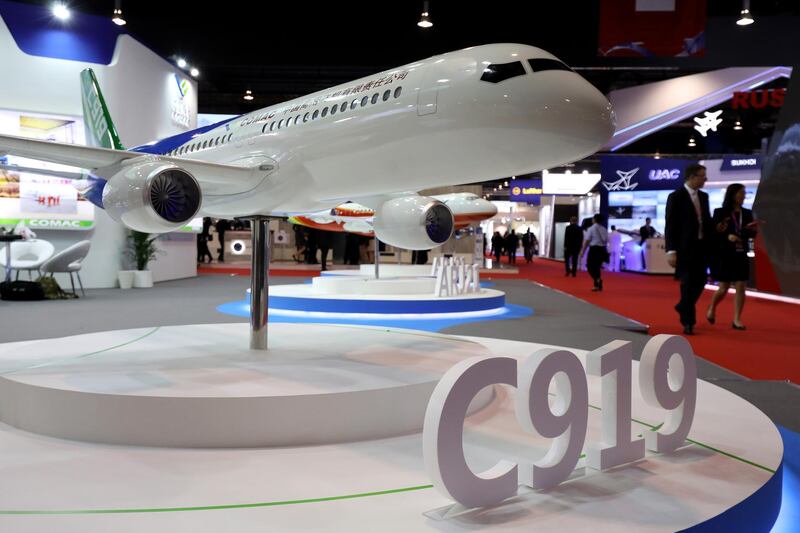A global grounding of Boeing 737 Max jets and an inquiry into its certification process may create an opportunity for China to compete in the narrow-body plane market as airlines fret about orders from the US manufacturer.
China's state-owned Commercial Aircraft Corporation of China (Comac) is building the C919, a narrow-body passenger jet with a capacity of around 170 seats, which will compete with 737 Max and Airbus A320 Neo.
The jet has dozens of customers with 815 orders and is a symbol of China’s civil aerospace ambitions to become a global plane company and shake up the Western companies’ domination of the skies.
“This is an opportunity for China and Russia to step up their marketing efforts and secure orders outside their domestic markets,” Diogenis Papiomytis, global programme director for commercial aviation at consultancy Frost and Sullivan, said. “This could prove to be the beginning of the end for the duopoly of Airbus and Boeing.”
Boeing is grappling with the fallout after its best-selling 737 Max jet was involved in two deadly crashes within five months, prompting US lawmakers to investigate its certification process.
China, which has 20 per cent of all delivered Max jets, was the first major regulator to ground the plane hours after Ethiopian Airlines flight 302 crashed on March 10.
The country be seeking can now benefit from the rival 737’s woes by attracting more sales for its Comac C919.
Indonesia's national airline Garuda has told Boeing that it wants to cancel its order of 49 of the 737 Max 8 jets, citing a loss of passenger trust after the crashes. It is the first airline to publicly scrap Boeing orders.
“I expect Comac will intensify their marketing to airlines outside China and would not be surprised if some airlines switched their orders from the Max to the C919,” Mr Papiomytis said.
Garuda’s decision and reason the reasoning that passengers do not trust the safety of the aircraft are another blow to Boeing, which is facing its worst crisis in years following the crashes.
With European rival Airbus unable to benefit from the Boeing fallout since it already runs a full production of its A320 and has years-long backlogs, Shanghai’s Comac jets become an attractive alternative, Mr Papiomytis said.
The C919 completed its maiden test flight in 2017. Comac is now working to have its jet certified in 2020 and it is due to enter service in 2021, when China Eastern Airlines takes its first delivery of the home-grown aircraft.
China has the added edge of investing in a global aerospace supply chain and acquiring companies that are suppliers to the Western jet makers, while also being a global player in aircraft financing and leasing, analysts say.
While the Chinese manufacturer would like to break the existing commercial aircraft duopoly of Airbus and Boeing, some analysts are sceptical of its ability to catch up to the industry heavyweights.
“The Chinese will have an opportunity in time but their narrow-body, the Comac C919, is too far away from production at this point,” said George Ferguson, aerospace analyst at Bloomberg Intelligence.
“We think they can’t build that airplane with any volume until mid-2020s.”
The 737 Max is already the fastest-selling plane with about 5,000 orders from more than 100 airlines, while the C919 certification has been proceeding slowly.
“The Chinese aircraft will attract orders in their home markets but little more than that as they address the smaller regional jet market and lack global infrastructure for spares support,” aviation consultant John Strickland said.
The C919 has not yet flown commercially and must prove to airlines that it is fuel efficient and economical to operate.
Since airlines typically prefer planes with proven reliability and safety track record, it may be at least another decade before Comac joins the big league of Airbus and Boeing.
It will also have to compete with them on repairs and maintenance services.
China, which is building mainly customised versions of plane parts from other manufacturers, is replicating older versions of jets rather than innovating in state-of-the-art technology, analysts say.








